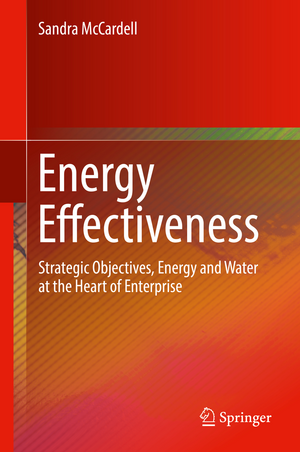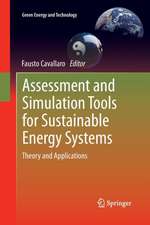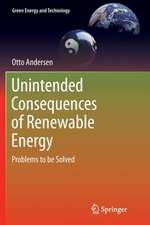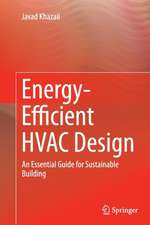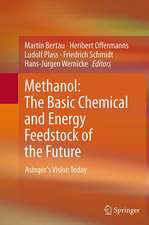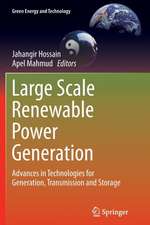Energy Effectiveness: Strategic Objectives, Energy and Water at the Heart of Enterprise
Autor Sandra McCardellen Limba Engleză Hardback – 29 iun 2018
| Toate formatele și edițiile | Preț | Express |
|---|---|---|
| Paperback (1) | 581.79 lei 43-57 zile | |
| Springer International Publishing – 22 ian 2019 | 581.79 lei 43-57 zile | |
| Hardback (1) | 644.49 lei 43-57 zile | |
| Springer International Publishing – 29 iun 2018 | 644.49 lei 43-57 zile |
Preț: 644.49 lei
Preț vechi: 758.23 lei
-15% Nou
Puncte Express: 967
Preț estimativ în valută:
123.34€ • 128.43$ • 104.24£
123.34€ • 128.43$ • 104.24£
Carte tipărită la comandă
Livrare economică 10-24 martie
Preluare comenzi: 021 569.72.76
Specificații
ISBN-13: 9783319902531
ISBN-10: 3319902539
Pagini: 240
Ilustrații: XIV, 238 p. 101 illus., 90 illus. in color.
Dimensiuni: 155 x 235 mm
Greutate: 0.53 kg
Ediția:1st ed. 2018
Editura: Springer International Publishing
Colecția Springer
Locul publicării:Cham, Switzerland
ISBN-10: 3319902539
Pagini: 240
Ilustrații: XIV, 238 p. 101 illus., 90 illus. in color.
Dimensiuni: 155 x 235 mm
Greutate: 0.53 kg
Ediția:1st ed. 2018
Editura: Springer International Publishing
Colecția Springer
Locul publicării:Cham, Switzerland
Cuprins
Chapter 1. Introduction.- Part I.The Context.- Chapter 2.Energy Around the Globe.- Chapter 3.Managing in Organizations.- Chapter 4.The History of Energy Use.- Chapter5. Energy Flows and Water Flows; Types of Energy.- Part II. Organization and Energy.- Chapter 6.Energy Flows & Management Practices in Organizations.- Chapter 7.Energy Inside Organizations - the Four Fields.- Chapter 8. Benefits, Barriers, and Opportunities.- Chapter 9. Tools and Methodologies.- PArt III. Introducing and Using the Strategic Energy Effectiveness Framework (SEE).- Chapter 10.-Energy and water in the System and for a Purpose.- Chapter 11. Utility Benefits and Risks.- Chapter 12. Utility Bill Analysis.- Chapter 13.External Assessment.- Chapter 14.Goals.- Chapter 16.Energy Business Plan.- Chapter 17.Implement and Manage the Plan.- Chapter 18. The Feedback Loop.- Part IV.Putting It All Together.- Chapter 19.The Strategic Energy Effectiveness Framework.- Chapter 20.Framework Checklists.- Chapter 21.SelectedResources.
Notă biografică
Ms. McCardell is President of Current-C Energy Systems, an Energy Services Company (ESCO) in the American Southwest. She provides expertise in alternative energy and energy efficiency, community and economic development, green building, financial analysis, sustainability, and strategic planning for a variety of organizations and communities. Over the past three decades, Ms. McCardell has focused on “green” efforts in the US and in other countries.. She has acted as Advisor to Afghanistan’s Ministry of Energy and Water under a USAID project, as a Community Developer on the Navajo Reservation defining and implementing energy projects, and as an advisor or consultant to hospitals, manufacturing organizations, engineering companies, nonprofits, school districts, and others. Ms. McCardell also serves as Adjunct Professor for the University of New Mexico Branch Campuses (Valencia / Gallup), teaching classes in green building, renewable energy, and energy efficiency.
Textul de pe ultima copertă
This book describes practical ways to understand energy and water use in organizations and then manage or control that use, thereby reducing risk and cost. The author presents a strategic framework to focus on the types of questions that should be addressed internally, Including evaluation of potential projects, planning and implementing energy projects, and evaluating results. The premise is that no modern organization can exist without energy, despite the fact that energy is also one of the mandatory inputs that receives little to no attention in most organizations. This work highlights methodologies and projects that illuminate ways in which energy management is central to an organization’s success, considering in each case the four main determinants of energy use: People, Buildings, Equipment /Processes, and the Environment. The book constitutes a complete energy savings resource for business owners, middle managers, and building and energy managers, providing options, free tools, and flexible project templates.
Caracteristici
Demonstrates how to define, measure and balance an organization’s unique needs within an integrated energy savings approach; Highlights suggestions for evaluating success and proving energy savings’ financial and cultural impacts; Case studies based on successful projects assess techniques such as energy audits, management using monitoring and controls systems, organizational change methodologies, and ISO "continuous improvement" strategies in the context of a full program of effective energy management
